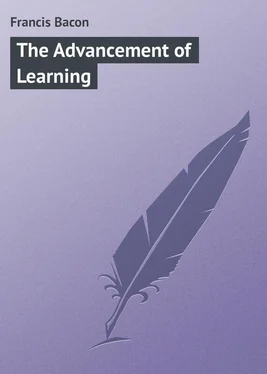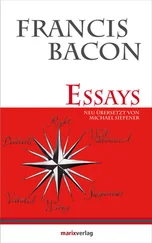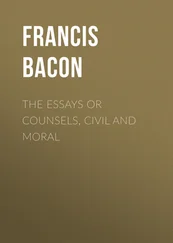Francis Bacon - The Advancement of Learning
Здесь есть возможность читать онлайн «Francis Bacon - The Advancement of Learning» — ознакомительный отрывок электронной книги совершенно бесплатно, а после прочтения отрывка купить полную версию. В некоторых случаях можно слушать аудио, скачать через торрент в формате fb2 и присутствует краткое содержание. Год выпуска: 0101, Жанр: foreign_antique, foreign_prose, на английском языке. Описание произведения, (предисловие) а так же отзывы посетителей доступны на портале библиотеки ЛибКат.
- Название:The Advancement of Learning
- Автор:
- Жанр:
- Год:0101
- ISBN:нет данных
- Рейтинг книги:5 / 5. Голосов: 1
-
Избранное:Добавить в избранное
- Отзывы:
-
Ваша оценка:
- 100
- 1
- 2
- 3
- 4
- 5
The Advancement of Learning: краткое содержание, описание и аннотация
Предлагаем к чтению аннотацию, описание, краткое содержание или предисловие (зависит от того, что написал сам автор книги «The Advancement of Learning»). Если вы не нашли необходимую информацию о книге — напишите в комментариях, мы постараемся отыскать её.
The Advancement of Learning — читать онлайн ознакомительный отрывок
Ниже представлен текст книги, разбитый по страницам. Система сохранения места последней прочитанной страницы, позволяет с удобством читать онлайн бесплатно книгу «The Advancement of Learning», без необходимости каждый раз заново искать на чём Вы остановились. Поставьте закладку, и сможете в любой момент перейти на страницу, на которой закончили чтение.
Интервал:
Закладка:
II. (1) And as for the disgraces which learning receiveth from politics, they be of this nature: that learning doth soften men’s minds, and makes them more unapt for the honour and exercise of arms; that it doth mar and pervert men’s dispositions for matter of government and policy, in making them too curious and irresolute by variety of reading, or too peremptory or positive by strictness of rules and axioms, or too immoderate and overweening by reason of the greatness of examples, or too incompatible and differing from the times by reason of the dissimilitude of examples; or at least, that it doth divert men’s travails from action and business, and bringeth them to a love of leisure and privateness; and that it doth bring into states a relaxation of discipline, whilst every man is more ready to argue than to obey and execute. Out of this conceit Cato, surnamed the Censor, one of the wisest men indeed that ever lived, when Carneades the philosopher came in embassage to Rome, and that the young men of Rome began to flock about him, being allured with the sweetness and majesty of his eloquence and learning, gave counsel in open senate that they should give him his despatch with all speed, lest he should infect and enchant the minds and affections of the youth, and at unawares bring in an alteration of the manners and customs of the state. Out of the same conceit or humour did Virgil, turning his pen to the advantage of his country and the disadvantage of his own profession, make a kind of separation between policy and government, and between arts and sciences, in the verses so much renowned, attributing and challenging the one to the Romans, and leaving and yielding the other to the Grecians: Tu regere imperio popules , Romane , memento , Hæ tibi erunt artes , &c. So likewise we see that Anytus, the accuser of Socrates, laid it as an article of charge and accusation against him, that he did, with the variety and power of his discourses and disputatious, withdraw young men from due reverence to the laws and customs of their country, and that he did profess a dangerous and pernicious science, which was to make the worse matter seem the better, and to suppress truth by force of eloquence and speech.
(2) But these and the like imputations have rather a countenance of gravity than any ground of justice: for experience doth warrant that, both in persons and in times, there hath been a meeting and concurrence in learning and arms, flourishing and excelling in the same men and the same ages. For as ‘for men, there cannot be a better nor the hike instance as of that pair, Alexander the Great and Julius Cæsar, the Dictator; whereof the one was Aristotle’s scholar in philosophy, and the other was Cicero’s rival in eloquence; or if any man had rather call for scholars that were great generals, than generals that were great scholars, let him take Epaminondas the Theban, or Xenophon the Athenian; whereof the one was the first that abated the power of Sparta, and the other was the first that made way to the overthrow of the monarchy of Persia. And this concurrence is yet more visible in times than in persons, by how much an age is greater object than a man. For both in Egypt, Assyria, Persia, Græcia, and Rome, the same times that are most renowned for arms are, likewise, most admired for learning, so that the greatest authors and philosophers, and the greatest captains and governors, have lived in the same ages. Neither can it otherwise he: for as in man the ripeness of strength of the body and mind cometh much about an age, save that the strength of the body cometh somewhat the more early, so in states, arms and learning, whereof the one correspondeth to the body, the other to the soul of man, have a concurrence or near sequence in times.
(3) And for matter of policy and government, that learning, should rather hurt, than enable thereunto, is a thing very improbable; we see it is accounted an error to commit a natural body to empiric physicians, which commonly have a few pleasing receipts whereupon they are confident and adventurous, but know neither the causes of diseases, nor the complexions of patients, nor peril of accidents, nor the true method of cures; we see it is a like error to rely upon advocates or lawyers which are only men of practice, and not grounded in their books, who are many times easily surprised when matter falleth out besides their experience, to the prejudice of the causes they handle: so by like reason it cannot be but a matter of doubtful consequence if states be managed by empiric statesmen, not well mingled with men grounded in learning. But contrariwise, it is almost without instance contradictory that ever any government was disastrous that was in the hands of learned governors. For howsoever it hath been ordinary with politic men to extenuate and disable learned men by the names of pedantes ; yet in the records of time it appeareth in many particulars that the governments of princes in minority (notwithstanding the infinite disadvantage of that kind of state) – have nevertheless excelled the government of princes of mature age, even for that reason which they seek to traduce, which is that by that occasion the state hath been in the hands of pedantes : for so was the state of Rome for the first five years, which are so much magnified, during the minority of Nero, in the hands of Seneca, a pedenti ; so it was again, for ten years’ space or more, during the minority of Gordianus the younger, with great applause and contentation in the hands of Misitheus, a pedanti : so was it before that, in the minority of Alexander Severus, in like happiness, in hands not much unlike, by reason of the rule of the women, who were aided by the teachers and preceptors. Nay, let a man look into the government of the Bishops of Rome, as by name, into the government of Pius Quintus and Sextus Quintus in our times, who were both at their entrance esteemed but as pedantical friars, and he shall find that such Popes do greater things, and proceed upon truer principles of state, than those which have ascended to the papacy from an education and breeding in affairs of state and courts of princes; for although men bred in learning are perhaps to seek in points of convenience and accommodating for the present, which the Italians call ragioni di stato , whereof the same Pius Quintus could not hear spoken with patience, terming them inventions against religion and the moral virtues; yet on the other side, to recompense that, they are perfect in those same plain grounds of religion, justice, honour, and moral virtue, which if they be well and watchfully pursued, there will be seldom use of those other, no more than of physic in a sound or well-dieted body. Neither can the experience of one man’s life furnish examples and precedents for the event of one man’s life. For as it happeneth sometimes that the grandchild, or other descendant, resembleth the ancestor more than the son; so many times occurrences of present times may sort better with ancient examples than with those of the later or immediate times; and lastly, the wit of one man can no more countervail learning than one man’s means can hold way with a common purse.
(4) And as for those particular seducements or indispositions of the mind for policy and government, which learning is pretended to insinuate; if it be granted that any such thing be, it must be remembered withal that learning ministereth in every of them greater strength of medicine or remedy than it offereth cause of indisposition or infirmity. For if by a secret operation it make men perplexed and irresolute, on the other side by plain precept it teacheth them when and upon what ground to resolve; yea, and how to carry things in suspense, without prejudice, till they resolve. If it make men positive and regular, it teacheth them what things are in their nature demonstrative, and what are conjectural, and as well the use of distinctions and exceptions, as the latitude of principles and rules. If it mislead by disproportion or dissimilitude of examples, it teacheth men the force of circumstances, the errors of comparisons, and all the cautions of application; so that in all these it doth rectify more effectually than it can pervert. And these medicines it conveyeth into men’s minds much more forcibly by the quickness and penetration of examples. For let a man look into the errors of Clement VII., so lively described by Guicciardini, who served under him, or into the errors of Cicero, painted out by his own pencil in his Epistles to Atticus, and he will fly apace from being irresolute. Let him look into the errors of Phocion, and he will beware how he be obstinate or inflexible. Let him but read the fable of Ixion, and it will hold him from being vaporous or imaginative. Let him look into the errors of Cato II., and he will never be one of the Antipodes, to tread opposite to the present world.
Читать дальшеИнтервал:
Закладка:
Похожие книги на «The Advancement of Learning»
Представляем Вашему вниманию похожие книги на «The Advancement of Learning» списком для выбора. Мы отобрали схожую по названию и смыслу литературу в надежде предоставить читателям больше вариантов отыскать новые, интересные, ещё непрочитанные произведения.
Обсуждение, отзывы о книге «The Advancement of Learning» и просто собственные мнения читателей. Оставьте ваши комментарии, напишите, что Вы думаете о произведении, его смысле или главных героях. Укажите что конкретно понравилось, а что нет, и почему Вы так считаете.












